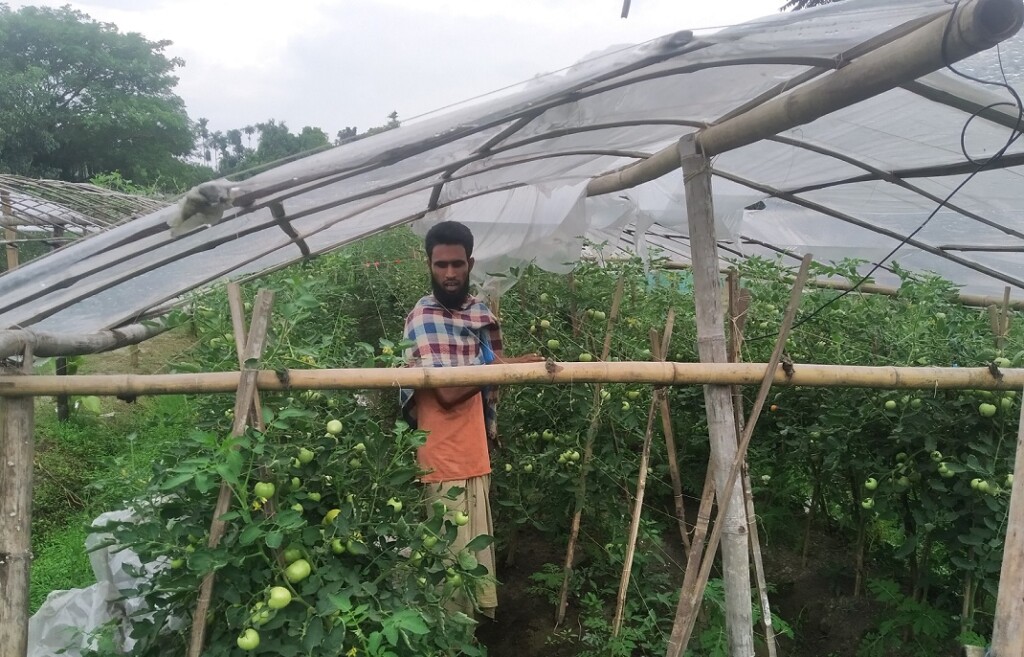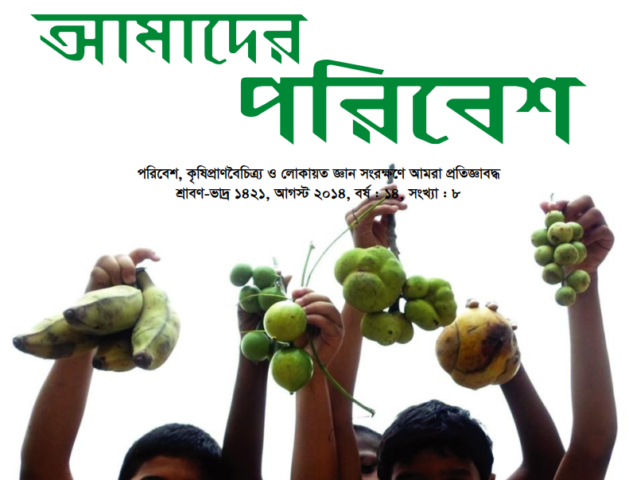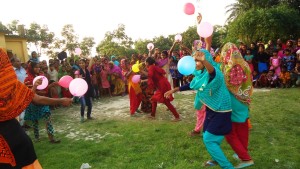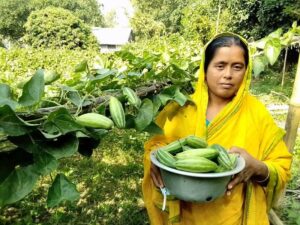Khadija Akhter Lita from Netrokona
Mahmudul Hasan of Bishwanathpur village in Amtala union of Netrokona district have harvested success in cultivating summer tomato for the second time. Last year, for the first time he experimentally farmed tomatoes in summer season and succeeded. He replicates the learning in farming summer tomatoes by farming the same crop in the same season covering more lands. And again, this time also he succeeded as he harvested huge yield that inspirers other farmers in his village. His initiatives has caught the attention of people and many passers-by stopped on their way to have a look at his tomato field! However, young Mahmudul had an accident in the near past and lost one arm at that accident but he did not lose heart rather he always tried to learn from other experienced and skilled farmers. His is an innovative and creative persons. It is his creativity and innovation that leads him to experimentally farm tomatoes in summer season!
However, BARCIK has been facilitating development activities in Netrakona region since 2001 mobilizing and motivating farmers to adopt sustainable agriculture that promote biodiversity conservation. The organization also motivates and encourages Mahmudul to adopt environment friendly agriculture farming and does provide him technical supports and materials. Based on advices and supports he received from BARCIK Mahmudul tries his best to farm crops and vegetable in an eco-friendly way. His success on farming summer season tomatoes also was covered by BARCIK through it communication works. A feature was published onto barciknews.com, a news portal managed by BARCIK. As a result, many farmers became more interested in tomato cultivation.
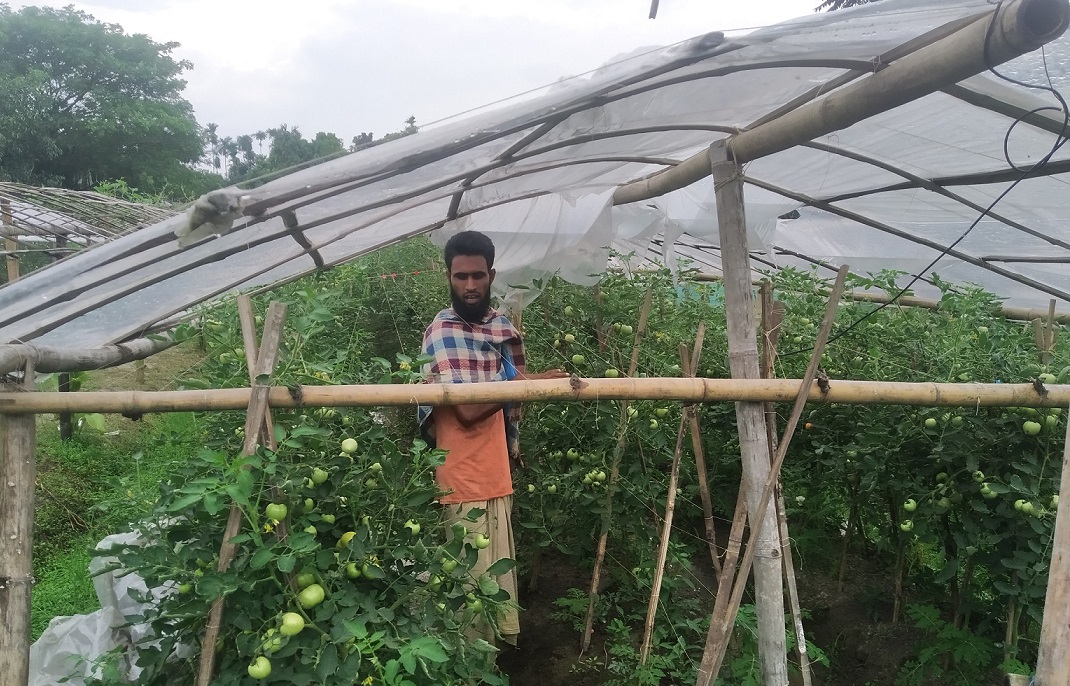
Mahmudul is sincere and keen to learn more things from his childhood. When he decides to do something, he tries his best. Thus, the indomitable will that he has helps him overcoming his physical impediments (lost one hand during the road accident) and paves the way for him to move forward. This year, Mahmudul has grown tomatoes on 10 decimal of his land and harvested good yield that earns him cash of 60 thousands. He said, ‘last year I had to buy tomato seedlings from farmers in other unions. My production cost due to the seedlings had to be brought from a long distance and some of the seedling got damaged on the way.’ Experiencing this loss, Mahmudul decided to make saplings by himself and learned the technique of producing seedlings from the experienced and skilled farmers. In order to translate his decision to reality he bought 20 grams of summer tomato seeds from Gazipur Agricultural Research Center. He also collected fruit seeds known as wild brinjal from the vicinity of the village. For summer tomato seedlings, wild eggplant seeds are dried and sown in grafting method to make one variety from two varieties. Regarding the reason for planting in this way, Mahmudul said, ‘Wild eggplant is a water tolerant tree. This tree does not rot in long rainy season. Summer tomato plants are affected by digestive diseases. Grafting seedlings become a waterlogging tolerant variety and its lifespan is longer. After preparing the seedlings by grafting method, the seedlings should be kept in open place for 7 to 8 days. It takes 45 days from seedbed to seedling growth.’
According to Mahmudul, one of the major activities of summer tomato cultivation is making beds and tents. The tent is made of polythene and bamboo. Land beds have to be made by purifying the soil. Mahmudul makes beds on 10 decimal of the land in such a way that when one tree grows, one tree does not stick to another. The distance from row to row is about one and a half feet. In this way, the light and air of the tree as well as the branches of one tree do not stick to another tree. After planting the seedlings, the scaffolding should be provided in such a way that rain water does not fall on the trees or fruits. Because when rain water falls on the tomatoes, the tomatoes burst. This creates problems for the fruit to grow.
Mahmudul did not only farm tomatoes but also other crops. This year, he has cultivated cucumber, bitter gourd, chilli and Data Punishak, which he sold in the market and earned 25 thousand cash. This helps him to meet family needs and expense. Mahmudul also take lease of lands to expand his agriculture works. He works hard to cut the soil and make ditches around the land so that water does not freeze after making the bed in the land. His younger brother also helps him his works. This year, he cultivates pumpkins and spinach in the rainy season, with which he distributes pumpkins, pumpkins and spinach among his family and neighbors and sells the rest for around 20 thousand take.
Mahmudul does all agriculture works in an eco-friendly way. He collects seeds from his own farm and conserves seeds in house so that he could use in the next seasons. This year, he has started collecting papaya and tomato seeds at home. Mamhudul said, ‘I had to go to Gazipur in Dhaka to buy summer tomato seeds. It costs me more to travel than the price of seeds. So I am planning to collect tomato seeds this year and cultivate them next season.’ On the other hand, Mahnudul uses organic manure and pesticides in farming vegetable and crops. He rears four to five cows at home throughout the year and use the dung as manure. Last year, with the help of BARCIK he learns the process to prepare vermi compost. Learning the technique he built a compost house and produced fertilizer and used it in vegetable fields. Farming in an eco-friendly way does not only reduces the production cost of Mahmudul but also contributes in making the environment fresh and alive. Besides, the they yields he produces from his agriculture farm is safe foods and has good market price as people prefer to consume safe food which are produced without using chemicals.
Mahmudul, a hard worker, did not lose his confidence when he lost one hand in an accident. He has the courage and will to do something by himself without depending on others. His confidence and creativity helps him to become one of the success young farmers in his village.
Translated by Silvanus Lamin

